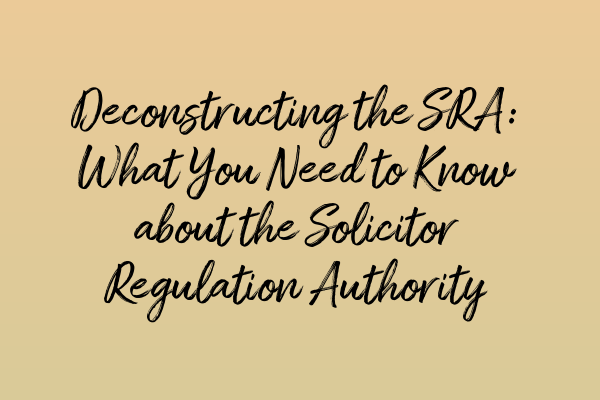Deconstructing the SRA: What You Need to Know about the Solicitor Regulation Authority
The Solicitor Regulation Authority (SRA) is an independent regulatory body responsible for ensuring that solicitors in England and Wales maintain high professional standards and provide quality legal services to their clients. Understanding the role and function of the SRA is essential for anyone aspiring to become a solicitor or seeking legal advice. In this article, we will explore the key aspects of the SRA and shed light on its importance in the legal profession.
The Role of the SRA
The SRA’s primary role is to protect the public by setting and enforcing the standards of conduct expected from solicitors. They achieve this by overseeing the education, training, and qualification requirements for solicitors, as well as by maintaining a Code of Conduct that solicitors must adhere to. By regulating the profession, the SRA aims to ensure that clients receive competent and ethical legal services.
Regulation and Compliance
The SRA operates with a dual focus on regulation and compliance. They have the power to investigate complaints made against solicitors and take disciplinary action if necessary. This ensures that solicitors who breach the rules or engage in misconduct are held accountable for their actions. The SRA also monitors compliance with regulations and carries out regular audits to ensure firms are meeting their obligations.
Education and Training
The SRA plays a crucial role in setting the standards for education and training required to become a solicitor. They accredit universities and law schools to ensure aspiring solicitors receive a high-quality legal education. Additionally, they oversee the Legal Practice Course (LPC), which all graduates must complete before becoming solicitors. By regulating education and training, the SRA aims to ensure solicitors are well-prepared and equipped with the necessary skills to serve their clients effectively.
Continuing Professional Development (CPD)
The SRA also requires solicitors to engage in ongoing CPD to keep their knowledge and skills up to date. Solicitors must complete a set number of CPD hours each year to demonstrate their commitment to professional development. By doing so, the SRA ensures that solicitors remain competent and capable of providing the best legal advice and representation to their clients.
Access to Justice and Diversity
The SRA recognizes the importance of promoting access to justice and equality in the legal profession. They actively work towards increasing diversity within the profession and ensuring equal opportunities for aspiring solicitors from all backgrounds. The SRA strives to create an inclusive and representative legal sector that reflects the society it serves.
Conclusion
In conclusion, the SRA plays a vital role in regulating the legal profession and ensuring the highest standards of professionalism and conduct among solicitors. By setting and enforcing rules, overseeing education and training, and promoting diversity, the SRA serves to protect the public and maintain the integrity of the legal profession. Understanding the SRA’s role and function is crucial for anyone seeking legal advice or pursuing a career as a solicitor in England and Wales.
For more information on related legal topics, check out our other articles:


Leave a Reply